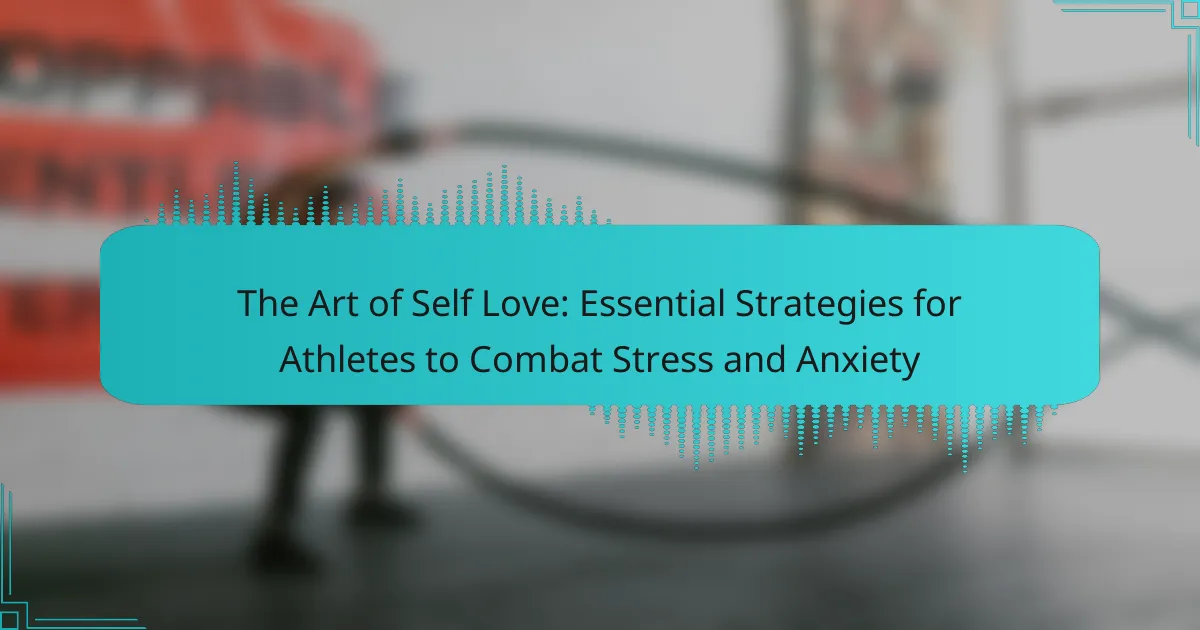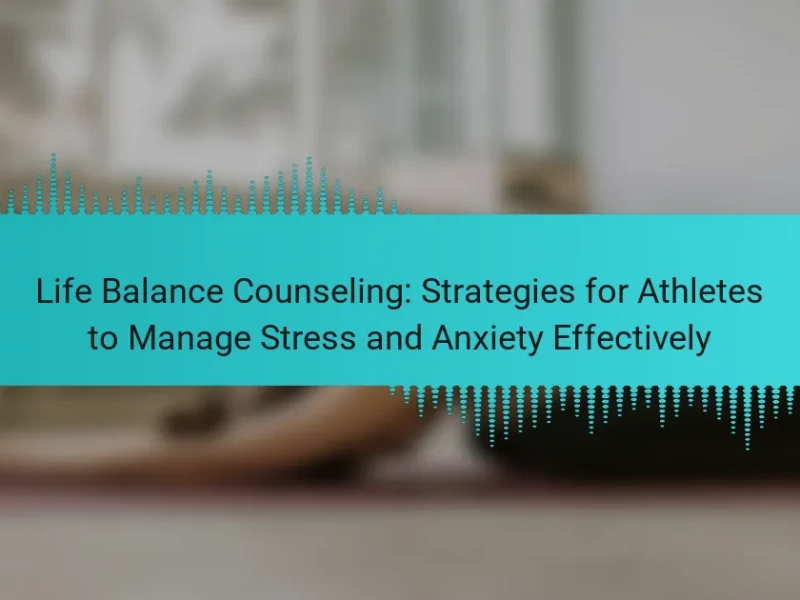Self-love is vital for athletes to reduce stress and anxiety, leading to improved performance and satisfaction. This article explores essential strategies like mindfulness, positive self-talk, and realistic goal-setting. Unique practices such as gratitude journaling and progressive muscle relaxation enhance mental resilience. Lastly, it emphasizes the importance of self-acceptance and avoiding comparisons to foster a healthier mindset.

How Does Self Love Impact Stress and Anxiety Levels in Athletes?
Self-love significantly reduces stress and anxiety levels in athletes by fostering resilience and emotional stability. Embracing self-love enhances athletes’ mental well-being, leading to improved performance and overall satisfaction. Research indicates that athletes who practice self-love experience lower cortisol levels, which is a hormone associated with stress. This practice promotes a positive self-image, encouraging athletes to handle challenges more effectively. Additionally, self-love cultivates a supportive inner dialogue, which can counteract negative thoughts and anxieties that often arise in competitive environments.
What Are the Key Components of Self Love for Athletes?
Self-love for athletes involves self-acceptance, mental resilience, and positive self-talk. Key components include setting realistic goals, practicing mindfulness, and maintaining a balanced lifestyle. Athletes should prioritize their mental health, engage in self-reflection, and cultivate supportive relationships. These strategies help combat stress and anxiety, enhancing overall performance.
How Can Athletes Identify Stress and Anxiety Triggers?
Athletes can identify stress and anxiety triggers by monitoring their emotional responses during training and competition. Keeping a journal to record feelings, thoughts, and physical sensations can reveal patterns. Common triggers include performance pressure, injury concerns, and external expectations. Recognizing these factors allows athletes to develop coping strategies, enhancing their mental resilience.
What Role Does Self Awareness Play in Managing Stress?
Self-awareness is crucial for managing stress as it enables athletes to recognize their emotional triggers. By understanding their thoughts and feelings, athletes can develop coping strategies tailored to their unique stressors. This insight fosters resilience, allowing for better performance under pressure. Moreover, self-awareness enhances mindfulness, which research shows can significantly reduce anxiety levels. Athletes who practice self-reflection are better equipped to maintain focus and composure, ultimately leading to improved mental well-being.
How Can Athletes Recognize Their Emotional Needs?
Athletes can recognize their emotional needs by engaging in self-reflection and mindfulness practices. This awareness allows them to identify stressors and emotional triggers. Journaling about feelings and experiences can reveal patterns and help clarify needs. Additionally, seeking feedback from coaches or peers can provide insights into emotional well-being.

What Universal Strategies Can Athletes Use to Cultivate Self Love?
Athletes can cultivate self-love through mindfulness, positive self-talk, and setting realistic goals. These strategies help reduce stress and anxiety, enhancing overall performance. Mindfulness practices, such as meditation, promote self-awareness and acceptance. Positive self-talk replaces negative thoughts, fostering a supportive inner dialogue. Setting realistic goals aligns expectations with abilities, preventing feelings of inadequacy. Embracing these techniques creates a healthier mindset, crucial for athletic success.
How Can Positive Self-Talk Enhance Performance?
Positive self-talk significantly enhances performance by boosting confidence and reducing anxiety. It fosters a positive mindset, allowing athletes to focus on their strengths and capabilities. Research indicates that athletes who engage in positive self-talk experience improved concentration and resilience during competition. This mental strategy can lead to better performance outcomes by enhancing motivation and reducing negative thoughts. By consistently practicing positive self-talk, athletes can create a supportive internal dialogue that empowers them to overcome challenges and achieve their goals.
What Are the Benefits of Setting Healthy Boundaries?
Setting healthy boundaries enhances mental well-being for athletes by reducing stress and anxiety. Benefits include improved focus, better relationships, and increased self-esteem. Athletes who establish boundaries can prioritize their mental health, leading to enhanced performance. This proactive approach fosters resilience and promotes a balanced lifestyle, crucial for long-term success in sports.
How Does Gratitude Practice Affect Mental Resilience?
Gratitude practice enhances mental resilience by fostering positive emotions and reducing stress. Regularly acknowledging what one is thankful for can shift focus away from negative thoughts, promoting a more optimistic outlook. Studies show that athletes who engage in gratitude exercises report lower levels of anxiety and improved performance under pressure. This unique attribute of gratitude practice serves as a powerful tool for athletes, helping them navigate the challenges of competition and training. As a result, cultivating gratitude can significantly bolster mental strength and emotional well-being.

What Unique Practices Can Athletes Implement for Self Care?
Athletes can implement unique practices such as mindfulness meditation, creative visualization, and gratitude journaling for self-care. These strategies enhance mental resilience, reduce stress, and promote a positive mindset. Mindfulness meditation helps athletes focus on the present, improving emotional regulation. Creative visualization allows them to mentally rehearse performances, boosting confidence. Gratitude journaling fosters appreciation, shifting focus from stressors to positive aspects of life. Integrating these practices into daily routines can significantly enhance athletes’ overall well-being.
How Can Visualization Techniques Reduce Anxiety?
Visualization techniques can significantly reduce anxiety by promoting relaxation and enhancing mental clarity. These methods enable athletes to create mental images of success, which can alleviate stress and improve focus during competitions. Research indicates that visualizing positive outcomes can lead to reduced cortisol levels, a hormone associated with stress. By integrating visualization into their training routines, athletes can cultivate a more resilient mindset, ultimately enhancing performance and overall well-being.
What Are the Advantages of Journaling for Mental Health?
Journaling offers numerous advantages for mental health, especially for athletes managing stress and anxiety. It enhances self-awareness, allowing individuals to reflect on their thoughts and emotions.
Regular journaling can improve emotional regulation by providing a safe space to express feelings. This practice also promotes mindfulness, helping athletes stay present and focused. Furthermore, it can serve as a stress relief tool, reducing anxiety levels by processing daily challenges.
Research indicates that journaling can lead to improved mood and overall mental well-being. By documenting experiences, athletes can identify patterns and triggers, leading to better coping strategies.
How Can Athletes Leverage Support Systems for Stress Relief?
Athletes can effectively leverage support systems for stress relief by seeking guidance, encouragement, and camaraderie. Engaging with coaches, teammates, and mental health professionals fosters resilience and provides coping strategies. Research indicates that social support significantly reduces anxiety levels, enhancing overall performance. Additionally, forming strong bonds within a team cultivates a sense of belonging, which is essential for mental well-being.

What Rare but Effective Techniques Exist for Stress Management?
Mindfulness meditation, progressive muscle relaxation, and expressive writing are rare but effective techniques for stress management. These strategies enhance self-awareness and emotional regulation, crucial for athletes facing anxiety. Mindfulness meditation focuses on present-moment awareness, reducing racing thoughts. Progressive muscle relaxation systematically relaxes muscle groups, alleviating physical tension. Expressive writing allows athletes to process emotions, fostering mental clarity. These techniques not only combat stress but also promote a positive self-image, essential for peak performance.
How Can Creative Expression Aid in Coping with Anxiety?
Creative expression significantly aids in coping with anxiety by providing athletes an outlet for emotions. Engaging in art, music, or writing helps reduce stress levels and enhances mental clarity. Studies show that creative activities can lower cortisol, a stress hormone, promoting relaxation. Incorporating these practices into training routines can improve overall performance and emotional resilience.
What Role Does Nature Play in Enhancing Athletic Well-Being?
Nature significantly enhances athletic well-being by reducing stress and anxiety levels. Engaging with natural environments promotes relaxation and mental clarity, which are crucial for athletes. Studies show that spending time outdoors can lower cortisol levels, improving overall mood and performance. Additionally, natural settings encourage physical activity, which further contributes to mental health benefits. Incorporating nature into training routines can lead to unique advantages, such as improved focus and resilience during competitions.
How Can Athletes Benefit from Unconventional Therapies?
Athletes can benefit from unconventional therapies by reducing stress and anxiety, enhancing performance, and promoting recovery. Techniques such as mindfulness, acupuncture, and art therapy offer unique approaches to mental well-being. Mindfulness improves focus and emotional regulation, while acupuncture may alleviate physical tension and stress. Art therapy fosters self-expression, allowing athletes to process emotions creatively. These therapies complement traditional methods, providing a holistic strategy for managing athletic pressures.

What Common Mistakes Should Athletes Avoid in Their Self Love Journey?
Athletes should avoid comparing themselves to others in their self-love journey. This mistake can lead to feelings of inadequacy and increased anxiety. Focusing on personal progress instead fosters a healthier mindset. Additionally, neglecting rest and recovery can hinder emotional well-being. Athletes must prioritize self-care routines to combat stress effectively. Lastly, dismissing negative emotions as weaknesses prevents growth; acknowledging and processing these feelings is essential for true self-love.
How Can Overtraining Impact Mental Health?
Overtraining can significantly harm mental health by increasing stress and anxiety levels. Athletes may experience mood swings, irritability, and depression due to excessive training without adequate recovery. Research indicates that overtraining alters neurotransmitter levels, contributing to these mental health issues. Prioritizing rest and self-care strategies is essential for maintaining mental well-being.
What Are the Pitfalls of Comparing Yourself to Others?
Comparing yourself to others can undermine self-love and increase stress for athletes. It often leads to feelings of inadequacy and anxiety, detracting from personal growth and performance. Instead, focus on individual progress and unique attributes. Embracing your journey fosters resilience and enhances mental well-being.
How Can Ignoring Emotional Health Affect Athletic Performance?
Ignoring emotional health can significantly impair athletic performance. Athletes who neglect their emotional well-being may experience increased stress and anxiety, leading to decreased focus and motivation. Emotional distress can manifest physically, causing fatigue and impacting recovery times. Studies show that athletes with strong mental health perform better under pressure, highlighting the importance of emotional strategies in training. Prioritizing self-love and mental resilience is essential for optimal performance.

What Expert Insights Can Help Athletes Foster Lasting Self Love?
Athletes can foster lasting self-love by embracing self-acceptance, practicing mindfulness, and setting realistic goals. These strategies combat stress and anxiety effectively. Self-acceptance involves recognizing strengths and weaknesses without harsh judgment, promoting a positive self-image. Mindfulness enhances awareness of thoughts and emotions, allowing athletes to respond rather than react. Setting realistic goals provides a sense of achievement and purpose, reinforcing self-worth. By integrating these insights, athletes cultivate resilience and emotional well-being, essential for peak performance.
What Are the Best Practices for Integrating Self Love into Daily Routines?
Incorporating self-love into daily routines enhances mental well-being for athletes. Start with mindfulness practices like meditation or journaling to reflect on personal achievements. Establish a consistent self-care schedule that includes physical activities and relaxation techniques. Surround yourself with positive influences and affirmations to reinforce self-worth. Lastly, set realistic goals to foster a sense of accomplishment and reduce stress.
How Can Athletes Maintain Self Love During Competitive Seasons?
Athletes can maintain self-love during competitive seasons by prioritizing mental well-being and practicing self-compassion. Regular mindfulness exercises reduce stress and enhance focus. Setting realistic goals fosters a positive mindset, while celebrating small achievements boosts self-esteem. Engaging in supportive social networks provides encouragement and accountability. Integrating recovery practices, such as adequate rest and nutrition, reinforces self-care and resilience.
What Tips Can Help Athletes Stay Committed to Their Mental Health?
Athletes can stay committed to their mental health by implementing consistent self-care practices. Prioritizing mental health through mindfulness, regular physical activity, and open communication fosters resilience. Setting realistic goals and establishing a support network enhances accountability. Engaging in relaxation techniques, such as meditation or yoga, reduces stress and anxiety. Tracking progress in mental well-being reinforces commitment and encourages positive habits.


